Discover folk - the CRM for people-powered businesses
En 2025, las firmas de capital privado enfrentan el desafío cada vez mayor de gestionar relaciones complejas con los inversores y navegar por las complejidades del flujo de operaciones. Para mantenerse a la vanguardia, se ha vuelto necesario aprovechar las mejores soluciones de CRM (Gestión de Relaciones con Clientes) diseñadas específicamente para esta industria.
Pero con muchas opciones disponibles, ¿cómo puedes asegurarte de que estás seleccionando la adecuada para las necesidades únicas de tu firma? En esta entrada del blog, analizamos el mejor CRM para capital privado de 2025, las características esenciales a buscar y cómo tomar una decisión informada al elegir la solución de CRM perfecta para tu firma.
Las Mejores Soluciones de CRM de Capital Privado en 2025
folk CRM
Descripción General
folk CRM es una plataforma moderna de gestión de relaciones diseñada para equipos ágiles, incluidas las firmas de capital privado que buscan simplicidad, eficiencia y rápida adopción. Combina una interfaz elegante e intuitiva con automatizaciones impulsadas por IA, flujos de trabajo inteligentes y plantillas personalizables, lo que la hace ideal para firmas que desean centrarse más en la búsqueda y gestión de acuerdos en lugar de configurar sistemas complejos.
A diferencia de los CRMs tradicionales, folk está diseñada para ser implementada en horas, no en meses, ofreciendo una estructura ligera pero poderosa para los equipos de capital privado que valoran la velocidad y la personalización.
Ventajas
- Extremadamente rápido de configurar y fácil de usar
- Flujos de trabajo inteligentes impulsados por IA (por ejemplo, recordatorios de seguimiento, secuencias automatizadas)
- Interfaz limpia y moderna que reduce la fricción
- Integraciones poderosas (Google Workspace, LinkedIn, Zapier, APIs)
- Altamente personalizable sin necesidad de codificación
- Muy asequible en comparación con los CRMs tradicionales de capital privado
- Excelente soporte al cliente y asistencia en la incorporación
Desventajas
- Jugador más nuevo en comparación con los sistemas heredados (menor reconocimiento de marca)
- Algunas funciones avanzadas de informes pueden requerir integraciones de terceros
- Menos adecuado para firmas de capital privado extremadamente grandes con estructuras multi-entidad complejas
Precios
- Plan Estándar: $20/usuario/mes (facturado anualmente)
- Plan Premium: $40/usuario/mes (facturado anualmente)
- Sin tarifas ocultas, sin costos de configuración.
Affinity CRM
Descripción General
Affinity CRM es una plataforma de inteligencia de relaciones originalmente construida para firmas de capital de riesgo, pero cada vez más adoptada por actores de capital privado. Su fortaleza radica en su capacidad para capturar y mapear automáticamente las interacciones a través de correos electrónicos, reuniones y redes, proporcionando a los equipos de acuerdos profundas perspectivas sobre la solidez de sus relaciones sin necesidad de entrada manual de datos.
Affinity se centra en gran medida en la IA y la automatización para agilizar la búsqueda y seguimiento de acuerdos.
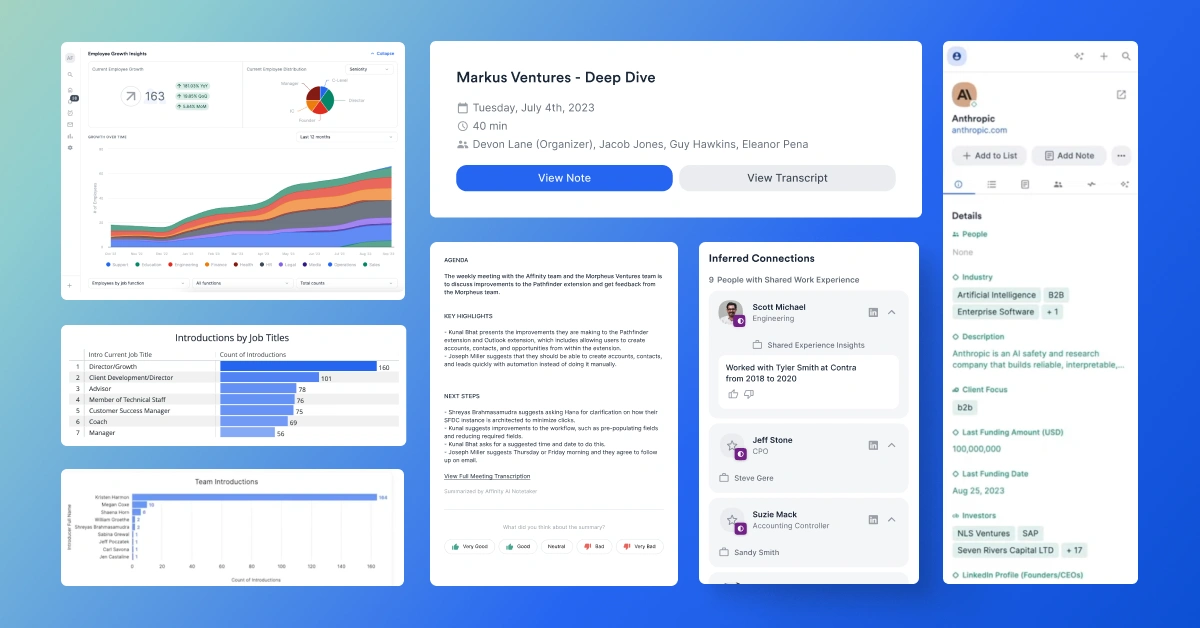
Ventajas
- Captura automática de datos y mapeo de relaciones
- Análisis de relaciones profundos impulsados por IA
- Interfaz fácil de usar con una curva de aprendizaje mínima
- Se integra bien con los ecosistemas de Google y Microsoft
- Inteligencia de red avanzada (por ejemplo, sugerencias de introducción cálida)
Desventajas
- Costoso para firmas de capital privado pequeñas y medianas
- Menos personalizable en comparación con los CRMs tradicionales
- Principalmente diseñado para la búsqueda de acuerdos — no para la gestión completa de inversiones
- Informes y análisis limitados más allá de las relaciones
Precios
- A partir de aproximadamente $2,000–$2,700/usuario/año
- Planes empresariales personalizados disponibles para equipos más grandes.
DealCloud
Descripción General
DealCloud es una poderosa plataforma de CRM y gestión de acuerdos construida específicamente para capital privado, banca de inversión y firmas de bienes raíces. Conocida por su alto grado de personalización, ofrece profundas capacidades en gestión de pipeline, seguimiento de cumplimiento, recaudación de fondos y monitoreo de cartera.
Es una solución robusta de nivel empresarial que puede escalar con organizaciones de inversión complejas y de múltiples oficinas — pero viene con un costo elevado.
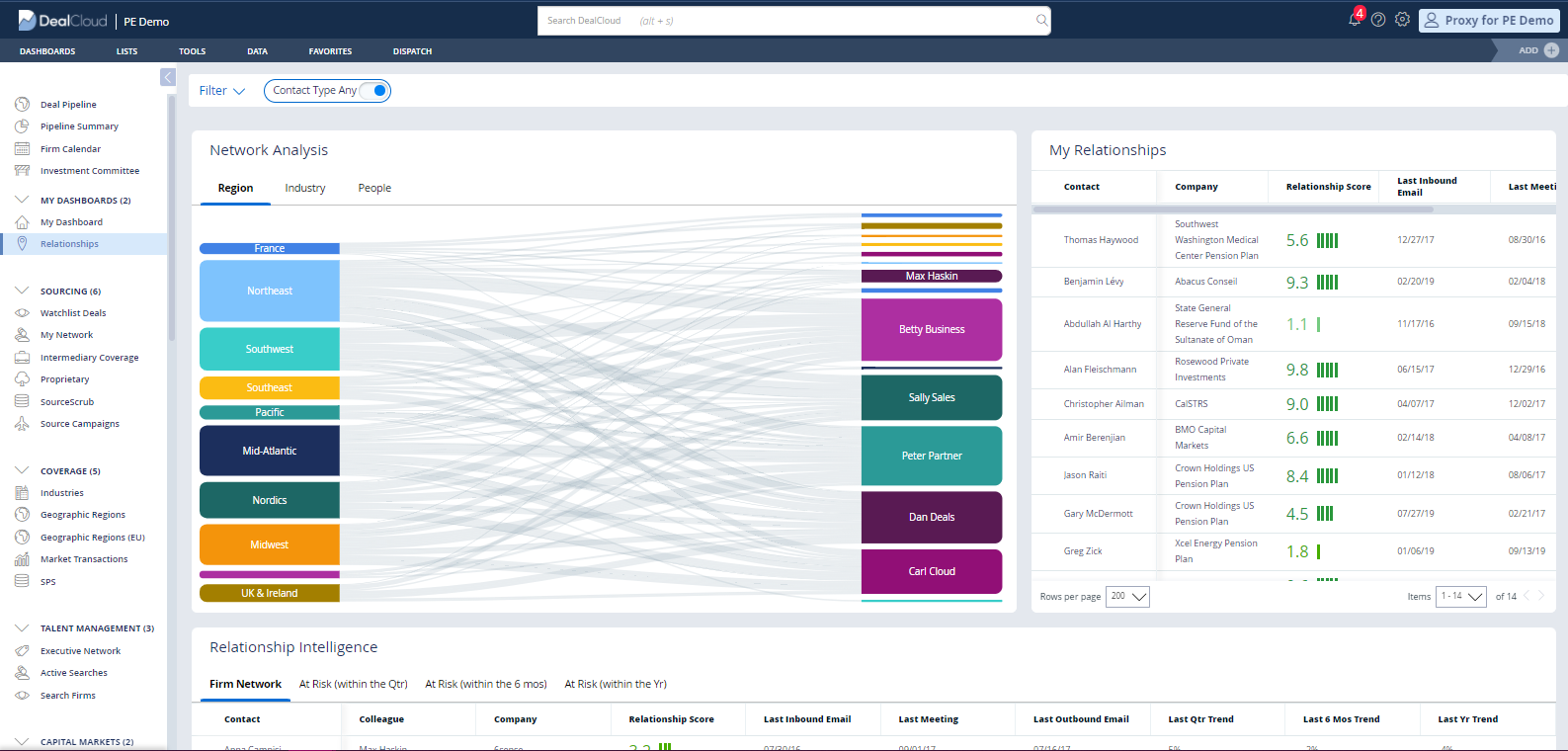
Ventajas
- Construido específicamente para mercados de capital privado
- Campos, paneles y flujos de trabajo altamente personalizables
- Fuertes capacidades de cumplimiento regulatorio y auditoría
- Seguridad y controles de acceso de nivel empresarial
- Herramientas detalladas de monitoreo de cartera
Desventajas
- Costo de propiedad extremadamente alto
- Tiempos de implementación largos (pueden tomar meses)
- Requiere consultores técnicos para personalización y mantenimiento
- La experiencia de usuario puede sentirse desactualizada en comparación con CRMs más nuevos y ligeros
- Complejo para firmas de capital privado más pequeñas sin recursos de TI dedicados
Precios
- Precios personalizados, generalmente a partir de $100,000+/año
- Las tarifas de implementación y los servicios de soporte continuo suelen aplicarse.
Salesforce (para Capital Privado)
Descripción General
Salesforce, una de las principales plataformas de CRM del mundo, ofrece amplias posibilidades de personalización para firmas de capital privado a través de su Sales Cloud y Financial Services Cloud especializado. Con Salesforce, las firmas pueden construir pipelines de acuerdos personalizados, sistemas de seguimiento de recaudación de fondos y modelos de compromiso con LP.
Sin embargo, Salesforce es una plataforma pesada que requiere recursos significativos para configurar, personalizar y mantener — a menudo es más adecuada para firmas más grandes con equipos técnicos internos.

Ventajas
- Extremadamente flexible y escalable para flujos de trabajo de capital privado
- Ecosistema masivo de integración (aplicaciones, APIs, servicios)
- Informes, paneles y análisis potentes
- Fuerte aplicación móvil y accesibilidad global
- Gran comunidad y consultores certificados de Salesforce en todo el mundo
Desventajas
- Requiere una personalización pesada para ajustarse a las necesidades específicas de capital privado
- Alto costo total de propiedad (licencias + consultores)
- Los ciclos de configuración e iteración pueden ser lentos
- La complejidad puede abrumar a equipos más pequeños
Precios
- Sales Cloud Essentials: Desde $25/usuario/mes
- Costos adicionales para Financial Services Cloud, aplicaciones de AppExchange, consultoría y soporte continuo.
Dynamo CRM
Descripción General
Dynamo CRM es una plataforma de CRM y gestión de inversiones de larga data que atiende específicamente a firmas de capital privado, capital de riesgo y bienes raíces. Proporciona un conjunto integral para gestionar la recaudación de fondos, la búsqueda de acuerdos, las relaciones con inversores y el monitoreo de cartera.
Si bien Dynamo es confiable por su profundidad y estabilidad, su interfaz y experiencia de usuario se sienten algo desactualizadas en comparación con CRMs más nuevos y modernos.
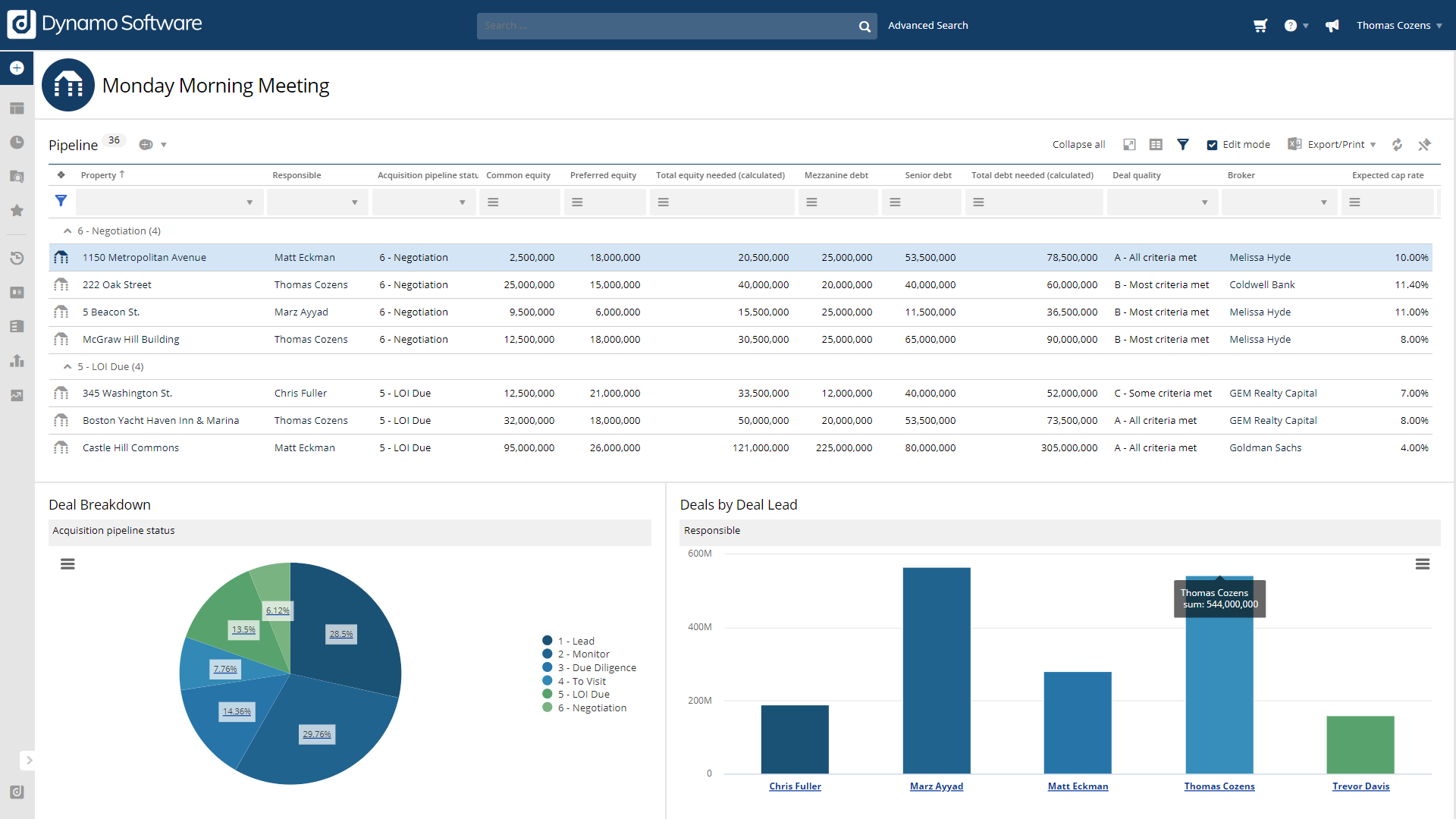
Ventajas
- Construido específicamente para la gestión de activos alternativos
- Sólidas características de recaudación de fondos y gestión de LP
- Fuertes capacidades de informes y análisis
- Buena seguridad y cumplimiento regulatorio
- Altamente experimentado en la atención a la industria de capital privado
Desventajas
- Interfaz de usuario torpe y anticuada
- Menos intuitivo en comparación con competidores modernos
- Curva de aprendizaje más larga para nuevos usuarios
- Menos innovación en automatización e IA
Precios
- A partir de alrededor de $7,500/año para equipos pequeños
- Cotizaciones personalizadas para necesidades más grandes o complejas.
Comprendiendo el CRM de Capital Privado
El panorama del capital privado se caracteriza por ciclos de negociación largos, negociaciones de alto riesgo y la necesidad de fomentar y mantener relaciones clave con los inversores. El software de CRM de capital privado es esencial para gestionar estas relaciones complejas, optimizar flujos de trabajo y mejorar el rendimiento general. Sirve como una plataforma centralizada para la gestión de datos y valiosos conocimientos, atendiendo específicamente a las necesidades únicas de las firmas de capital privado.
Los mejores CRMs de capital privado ofrecen una variedad de beneficios, incluyendo:
- Operaciones optimizadas
- Mayor transparencia
- Procesos automatizados
- Mejor colaboración
- Experiencia del inversor mejorada
- Mejores conocimientos
- Seguridad mejorada
Al aprovechar la solución de CRM adecuada, las firmas de capital privado pueden mantenerse a la vanguardia en el mercado competitivo, impulsar el crecimiento y gestionar las relaciones con los inversores de manera efectiva.
El Papel del CRM en el Capital Privado
El CRM desempeña un papel fundamental en el capital privado al automatizar procesos manuales, mejorar las relaciones con los inversores y proporcionar una única fuente de verdad para los datos y conocimientos. Esto permite a las firmas centrarse en sus competencias centrales mientras aseguran que tienen las herramientas necesarias para gestionar sus relaciones de manera efectiva. Al incorporar características como la gestión de acuerdos, la gestión de relaciones con inversores y la visualización de datos, los mejores CRMs de capital privado ayudan a las firmas a navegar el complejo mundo de la gestión de inversiones de manera más eficiente.
La gestión de acuerdos de principio a fin en el CRM de capital privado, por ejemplo, asiste a las firmas en la gestión de todo su proceso de inversión desde el inicio hasta la finalización, incluyendo la debida diligencia, la gestión de cartera, la entrada de datos y la elaboración de informes sobre los retornos de las inversiones. Esto permite a las firmas de capital privado tener un mejor control sobre sus procesos de inversión y tomar decisiones más informadas de manera oportuna.
Otro beneficio esencial es la capacidad de mantener conexiones sólidas con los inversores y gestionar el rendimiento del fondo de manera efectiva. Al rastrear las comunicaciones y proporcionar conocimientos sobre el rendimiento de los inversores, las soluciones de CRM de capital privado permiten a las firmas establecer y mantener relaciones a largo plazo con sus inversores, lo cual es crucial para el éxito y crecimiento de la firma.
Características Esenciales de los Mejores Sistemas CRM de Capital Privado
Los mejores sistemas CRM de capital privado deben tener características esenciales como:
- Gestión del flujo de negocios
- Gestión de relaciones con inversores
- Visualización de datos e informes
- Marketing por correo electrónico
- Opciones de integración y personalización
Estas soluciones CRM permiten a las empresas gestionar sus relaciones complejas de manera más efectiva, automatizar procesos tediosos y tomar decisiones mejor informadas.
Gestión del Flujo de Negocios
La gestión del flujo de negocios en CRM de capital privado ayuda a filtrar y rastrear negocios basados en el historial de inversiones, tipo de activo y tamaño del negocio, asegurando una eficiente obtención y ejecución de negocios. Al proporcionar una plataforma centralizada para gestionar la progresión de los negocios desde el contacto inicial hasta el cierre, las soluciones CRM de capital privado permiten a las empresas monitorear el estado de los negocios, gestionar contactos y proporcionar información sobre el rendimiento de los negocios.
Con una gestión eficiente del flujo de negocios, las empresas de capital privado pueden:
- Optimizar su proceso de obtención de negocios
- Tomar decisiones más informadas sobre qué negocios perseguir
- En última instancia, llevar a mejores resultados de inversión
- Ayudar a las empresas a desplegar capital de manera más efectiva
- Impulsar el crecimiento y mejorar el rendimiento general.
Aquí hay una vista de la función de gestión de pipeline de folk
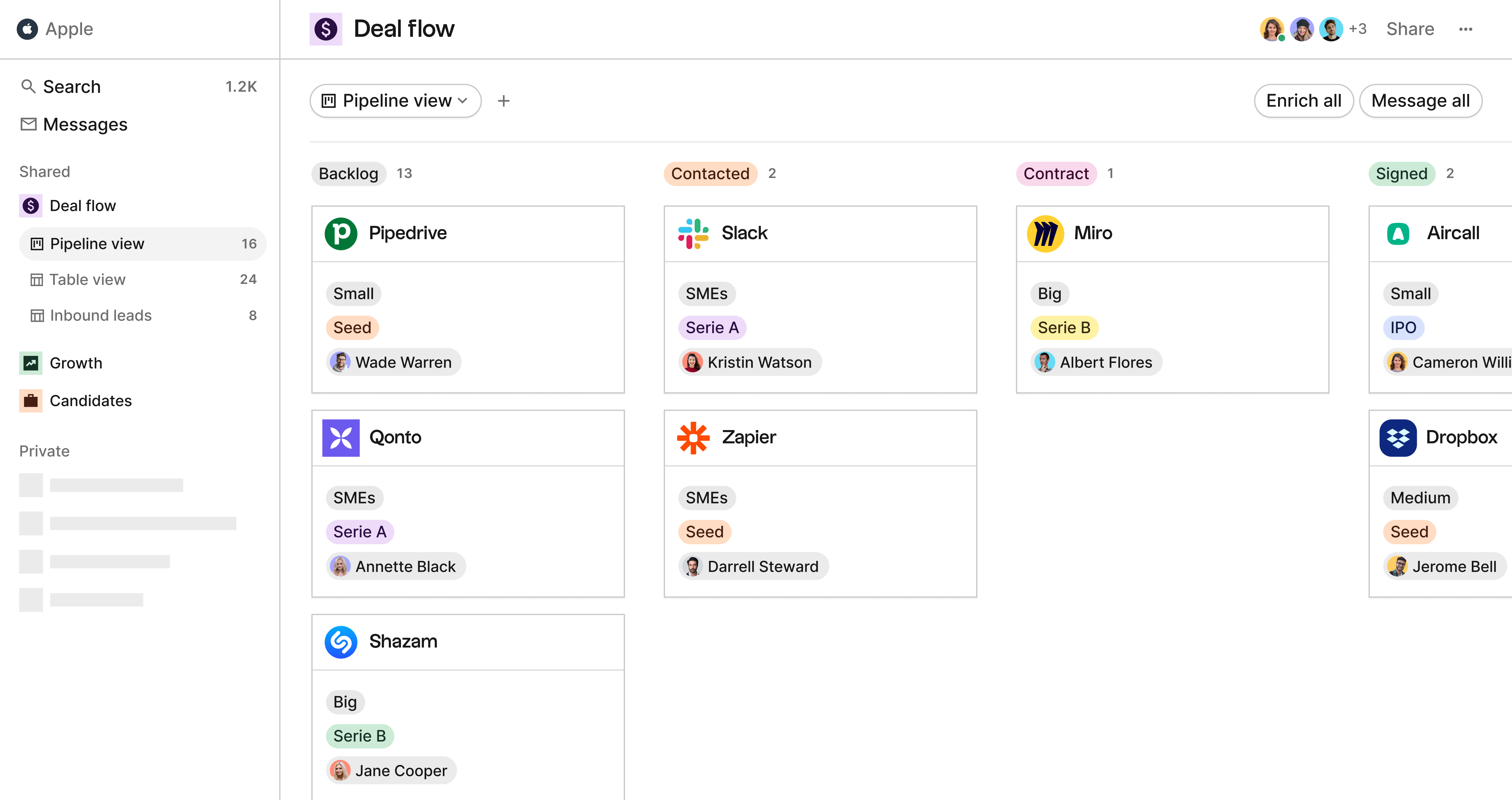
También viene con una plantilla fácil de usar.
Gestión de Relaciones con Inversores
La gestión de relaciones con inversores en CRM de capital privado permite a las empresas mantener conexiones sólidas con los inversores, rastrear comunicaciones y gestionar el rendimiento del fondo.
De muchas maneras, este proceso refleja la gestión de relaciones con el cliente, asegurando que se satisfagan y superen las necesidades y expectativas de los inversores.
Al mantener relaciones sólidas con los inversores y ofrecer comunicación transparente, las empresas de capital privado pueden construir confianza y lealtad con sus inversores, lo que en última instancia lleva a mejores resultados de inversión.

Visualización de Datos e Informes
Las características de visualización de datos e informes en CRM de capital privado permiten a las empresas:
- Analizar y presentar datos relevantes en gráficos y tablas interactivas para una mejor toma de decisiones
- Construir representaciones gráficas de datos para facilitar la comprensión por parte de los usuarios
- Descifrar datos complejos y tomar decisiones informadas basadas en los conocimientos proporcionados
Por ejemplo, la visualización de pipeline en CRM de capital privado permite a las empresas:
- Rastrear el progreso de la debida diligencia y todas las actividades dentro del pipeline de flujo de negocios
- Proporcionar una visión clara de sus procesos de inversión
- Identificar fácilmente tendencias, patrones y oportunidades
- Tomar decisiones mejor informadas
- Mejorar el rendimiento general
Con una visualización de datos e informes efectivos, las empresas de capital privado pueden optimizar sus estrategias de inversión y lograr un mayor éxito.
También se reduce a calcular métricas clave de fondos como el % de despliegue de capital, ROI en inversión, y más.
Marketing por Correo Electrónico para Oportunidades de Obtención y Actualizaciones para Inversores
Las características de marketing por correo electrónico en CRM de capital privado ayudan a obtener nuevas oportunidades y mantener a los inversores actualizados sobre el rendimiento de la cartera y noticias. Al aprovechar el poder del marketing por correo electrónico, las empresas de capital privado pueden contactar a posibles objetivos de adquisición, compartir actualizaciones relevantes de la industria y mantener un diálogo continuo con su cartera existente.
Si bien algunas soluciones CRM pueden tener capacidades limitadas de marketing por correo electrónico, otras ofrecen herramientas poderosas para el contacto cálido, permitiendo a las empresas personalizar sus comunicaciones y construir mejores relaciones con sus inversores. Al mantener a los inversores informados y comprometidos, las empresas de capital privado pueden fomentar la lealtad y la confianza, lo que en última instancia lleva a mejores resultados de inversión. Implementar estrategias de gestión de contactos puede mejorar aún más estas relaciones.
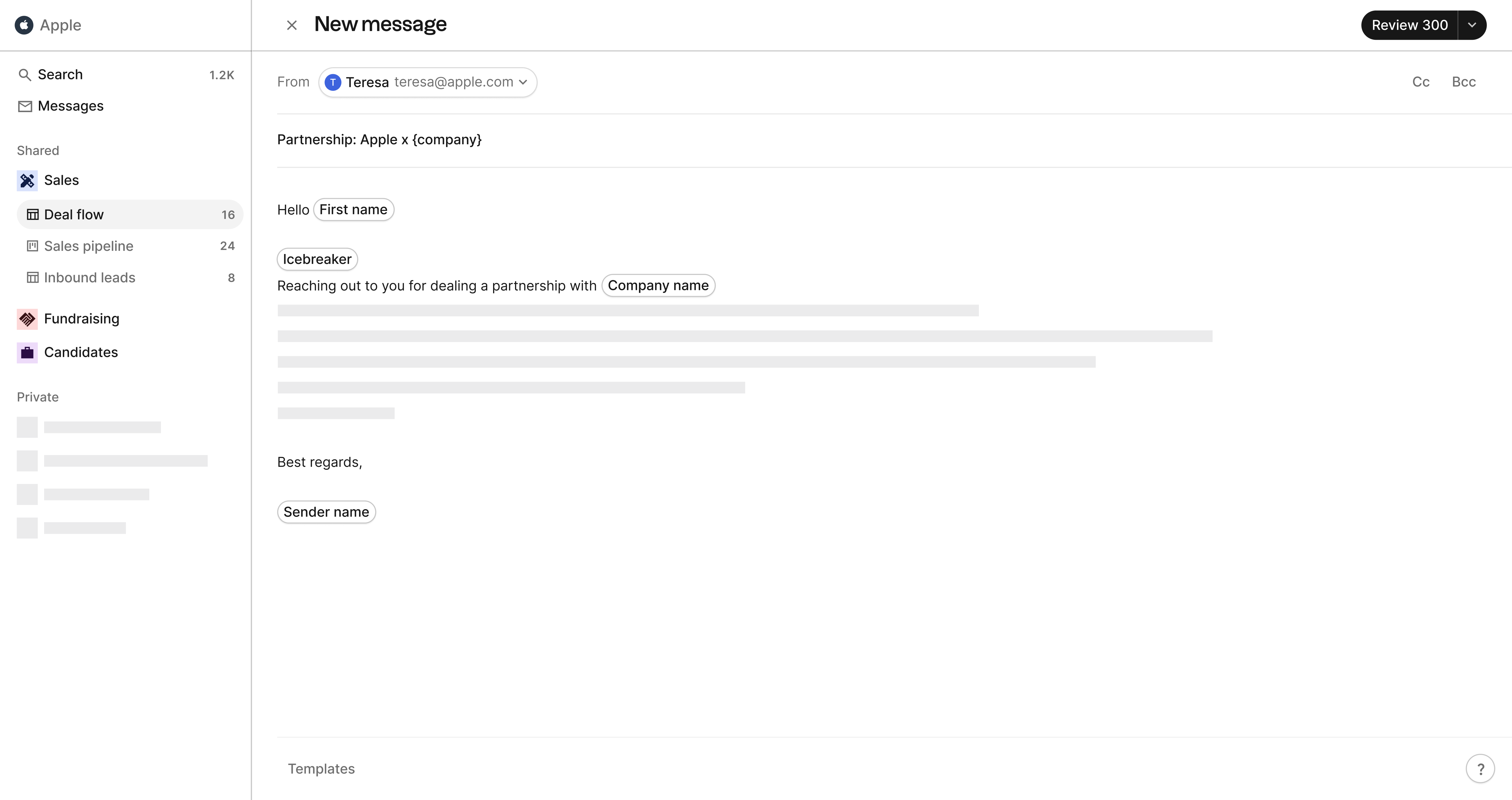
Integración y Personalización
Las opciones de integración y personalización en CRM de capital privado permiten a las empresas adaptar el software a sus necesidades únicas y conectarse con aplicaciones y fuentes de datos preferidas. Al ofrecer una gama de herramientas de integración de terceros y opciones de personalización, las soluciones CRM de capital privado permiten a las empresas crear una experiencia fluida que se adapte a sus requisitos específicos.
Las integraciones son múltiples pero generalmente se reducen a unas pocas categorías
- Herramientas de comunicación (Microsoft Outlook, Gmail, Google Calendar, etc)
- Herramientas de marketing por correo electrónico (MailChimp, etc)
- Proveedores de enriquecimiento (Crunchbase, Pitchbook, Clearbit, etc)
Los mejores CRM de capital privado, incluyendo el mejor CRM de capital privado, equipan a las empresas con las herramientas que necesitan para optimizar sus procesos y mejorar el rendimiento general. Las opciones de personalización, como agregar columnas a los tableros visualizados, aseguran que la solución CRM esté adaptada a las necesidades únicas de la empresa, permitiendo un flujo de trabajo más eficiente y efectivo.
Eligiendo el CRM adecuado para su firma de capital privado
Elegir el CRM adecuado para su firma de capital privado implica evaluar los requisitos de su firma, comparar soluciones de CRM y asegurar una implementación y capacitación adecuadas. Al tomarse el tiempo para evaluar las necesidades y requisitos únicos de su firma, puede identificar la solución de CRM que mejor se alinea con sus objetivos y maximiza el potencial de crecimiento en el competitivo mundo de la gestión de inversiones.
Comparar varias soluciones de CRM basadas en características, precios y reseñas de usuarios puede ayudarle a tomar una decisión informada al seleccionar la solución de CRM perfecta para su firma.
Además, asegurar una implementación y capacitación exitosa para su solución de CRM elegida puede ayudar a maximizar sus beneficios y mejorar el rendimiento general de su firma, impulsando en última instancia el crecimiento y el éxito en el competitivo mundo del capital privado. Una alternativa aquí consiste en optar por un CRM fácil de implementar que venga con plantillas como folk.app.
Evaluando los requisitos de su firma
Para determinar la solución de CRM más adecuada, es crucial evaluar las necesidades y requisitos únicos de su firma. Considere factores como la gestión del flujo de negocios, la gestión de relaciones con inversores y la visualización de datos para asegurar que la solución de CRM elegida aborde todos los aspectos de las operaciones de su firma.
Al evaluar minuciosamente los requisitos de su firma, puede identificar la solución de CRM que mejor se alinea con sus objetivos y maximiza el potencial de crecimiento en el competitivo mundo de la gestión de inversiones. Esto le permitirá tomar decisiones mejor informadas y mejorar el rendimiento general, impulsando en última instancia el crecimiento y el éxito de su firma.
Comparando soluciones de CRM
Una vez que haya evaluado los requisitos de su firma, es esencial comparar varias soluciones de CRM basadas en características, precios y reseñas de usuarios. Al examinar las diferentes opciones de software disponibles, puede identificar la solución de CRM más adecuada que cumpla con los requisitos únicos de su negocio.
Tómese el tiempo para investigar y analizar los pros y los contras de cada solución de CRM, teniendo en cuenta factores como la facilidad de uso, las opciones de personalización y las capacidades de integración. Al hacerlo, podrá tomar una decisión informada al seleccionar la solución de CRM perfecta para su firma, asegurándose de que cumpla con sus necesidades específicas y impulse el crecimiento de su negocio.
Implementación y capacitación
La implementación y capacitación adecuadas de su solución de CRM elegida pueden ayudar a maximizar sus beneficios y mejorar el rendimiento general de su firma. Para asegurar que la solución de CRM se implemente correctamente y que su personal esté adecuadamente capacitado, es importante asignar tiempo y recursos suficientes al proceso.
Al invertir en la implementación y capacitación exitosa de su solución de CRM elegida, puede asegurarse de que sea adoptada y utilizada de manera efectiva por su equipo. Esto permitirá a su firma:
- Optimizar sus procesos
- Mejorar las relaciones con inversores
- Tomar decisiones mejor informadas
- Impulsar en última instancia el crecimiento y el éxito en el competitivo mundo del capital privado.
Resumen
En conclusión, elegir la solución de CRM de capital privado adecuada es fundamental para gestionar relaciones complejas con los inversores y navegar por las complejidades del flujo de negocios. Al evaluar las necesidades únicas de su firma, comparar varias soluciones de CRM y garantizar una implementación y capacitación adecuadas, puede maximizar los beneficios de la solución de CRM elegida y impulsar el crecimiento de su firma en el competitivo mundo de la gestión de inversiones. Con la solución de CRM adecuada en su lugar, su firma estará mejor equipada para tener éxito y prosperar en el siempre cambiante panorama del capital privado.
Preguntas Frecuentes
¿Qué es CRM en capital privado?
CRM en capital privado es un sistema centralizado para ayudar a gestionar las relaciones con los inversores, monitorear y analizar el rendimiento de la cartera, integrar la contabilidad de fondos, automatizar flujos de trabajo y compartir información dentro de una plataforma. Juega un papel importante ya que puede ayudar a cultivar relaciones y apoyar la realización de acuerdos.
¿Qué es CRM en capital de riesgo?
El software de Gestión de Relaciones con Clientes (CRM) para firmas de capital de riesgo (VC) es la base de cómo se encuentran y completan las oportunidades de inversión, ayudando con la gestión de contactos, la gestión de ventas, la productividad de los agentes y la rentabilidad.
Puede ayudar a agilizar el proceso de encontrar y evaluar inversiones potenciales, así como a gestionar las relaciones con los inversores. También puede ayudar a rastrear y gestionar el proceso de ventas, desde el contacto inicial hasta el cierre del trato. Además, puede ayudar a aumentar la productividad de los agentes al automatizar tareas y proporcionar servicios.
¿Qué hace una empresa de CRM?
CRM significa Gestión de Relaciones con Clientes y es un sistema de software que ayuda a las empresas a rastrear las comunicaciones con los clientes, analizar datos de clientes, cultivar relaciones con prospectos y clientes, y hacer crecer su negocio más rápido.
Es una herramienta poderosa que puede ayudar a las empresas a agilizar sus procesos, mejorar el servicio al cliente y aumentar las ventas. También puede ayudar a las empresas a entender mejor a sus clientes y dirigir sus esfuerzos de marketing de manera más efectiva.
Los sistemas de CRM están volviéndose cada vez más populares a medida que las empresas se dan cuenta de los beneficios.
¿Cuáles son los principales beneficios de usar un CRM de capital privado?
Usar un CRM de capital privado trae beneficios significativos, como operaciones más ágiles, mayor transparencia, procesos automatizados y una mejor experiencia para el inversor. También ofrece una colaboración mejorada, mejores perspectivas y mayor seguridad.
Discover folk CRM
Like the sales assistant your team never had

